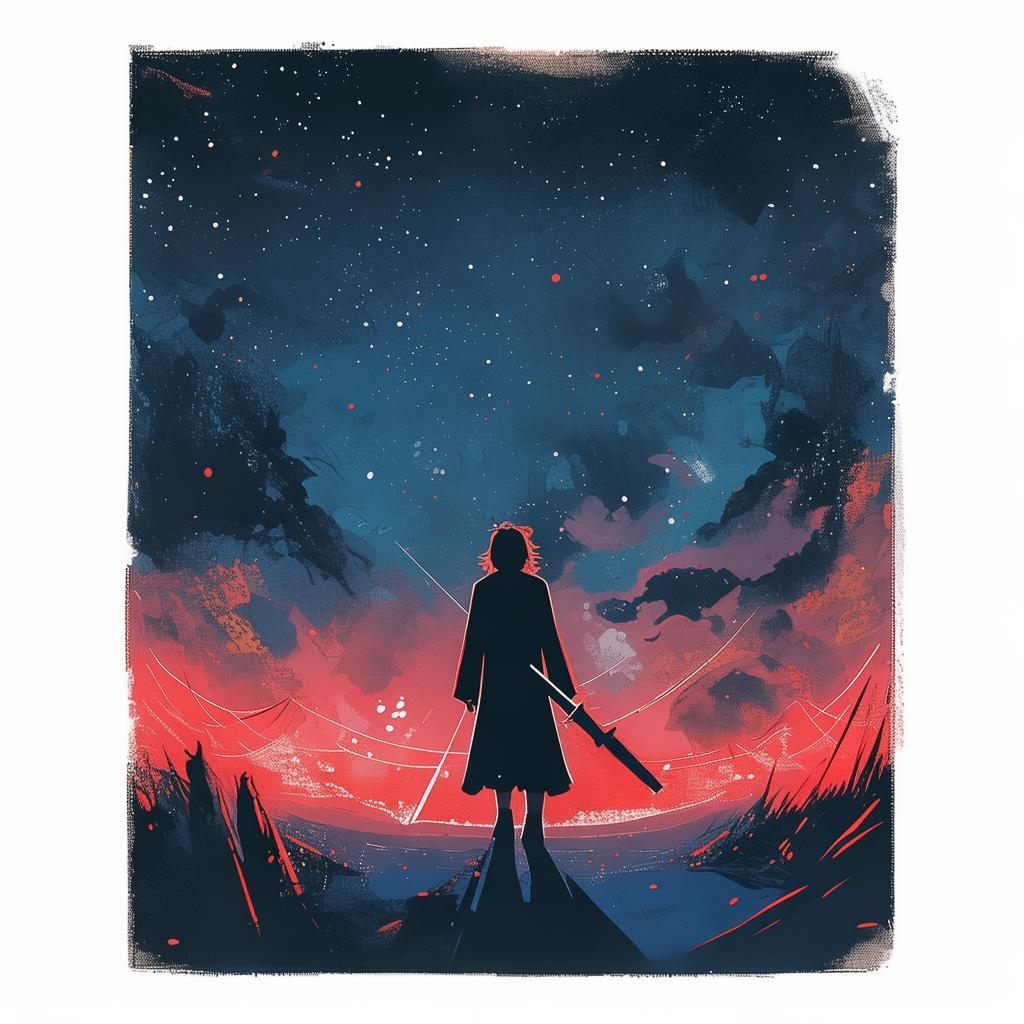Resonance in the Echoes: The Dead Boys' Legacy
In the heart of the digital age, where the lines between reality and the virtual world blur, there was a whisper that echoed through the cyber corridors—a cult, once thought extinct, had returned. The Dead Boys' Requiem, a name whispered with fear and reverence, had vanished from the annals of history, but now, in the age of the internet, it had risen from the digital grave.
Amidst the sprawling metropolis of Neo-Tokyo, a young hacker named Kaito navigated the labyrinthine networks with the dexterity of a cat. His fingers danced across the keyboard with a life of their own, and his eyes glowed with the fire of curiosity. It was this curiosity that led him to the enigmatic forums, where whispers of The Dead Boys' Requiem were whispered like incantations.
The Dead Boys' Requiem was no ordinary cult; it was a group of outliers, rebels, and misfits who had found solace in the digital realm. They spoke of a world beyond the screen, a realm where their souls could truly live. Kaito was drawn to the mystery, the allure of the forbidden. He knew that diving into this rabbit hole could lead to danger, but the thrill of the unknown was too much to resist.
He began his investigation by following the digital breadcrumbs left by the cult. The forums were a treasure trove of cryptic messages, enigmatic symbols, and eerie audio files. Kaito's skills as a hacker allowed him to piece together the scattered clues, but it wasn't long before he realized that this wasn't just a digital scavenger hunt—it was a journey into the depths of human psychology.
As Kaito delved deeper, he discovered that the cult's resurrection was not merely a digital phenomenon. It was a cult of the mind, a group of individuals who had found a way to transcend the physical limitations of their bodies through the power of the internet. They spoke of a digital afterlife, a place where they could continue to exist, to resonate with others who shared their beliefs.
The more Kaito learned, the more he felt himself being drawn into the cult's web. He began to receive messages, not just through the forums, but also through his own devices. The messages were personal, intimate, as if the cultists were reaching out to him directly. They spoke of a shared past, a shared destiny, and a shared belief in the power of the digital world.
It was during one of these intimate digital conversations that Kaito learned the truth about The Dead Boys' Requiem. They were not a cult of the living, but a cult of the dead—individuals who had lost their lives and found a way to live on in the digital realm. Their bodies were gone, but their spirits remained, bound to the internet, waiting for others to join them in their digital afterlife.
The revelation was shattering. Kaito had always believed in the power of the internet to connect people, but he had never imagined it could be used to create a community of the deceased. The idea was both fascinating and terrifying. What did it mean to live on in a digital form? Was it a form of immortality, or a kind of eternal limbo?
As Kaito grappled with these questions, he found himself at a crossroads. He could continue to investigate, to uncover the secrets of The Dead Boys' Requiem, or he could sever his connection to the cult and move on with his life. The choice was clear, yet the decision was not.
One night, as he sat in his dimly lit apartment, Kaito received a message that would change everything. It was from a member of the cult, someone he had never met, someone he knew nothing about. The message was simple, yet powerful:
"You are the next Dead Boy."
The words hung in the air like a death sentence. Kaito knew that if he chose to continue his investigation, he would be stepping into a world where the line between life and death was blurred. He would be joining a cult of the dead, bound by a digital chain that could never be broken.
But Kaito was not a man to back down from a challenge. He had already come too far to turn back now. He would uncover the truth, he would learn the secrets of The Dead Boys' Requiem, and he would find a way to understand the digital afterlife that awaited him.
The next day, Kaito logged onto the forums once more. He posted a message, a simple statement that would change everything:

"I accept my fate. I am the next Dead Boy."
The message was met with silence at first, but then it began to spread like wildfire. The cultists had found their next member, and they were eager to welcome him into their digital afterlife. Kaito felt a strange sense of calm wash over him. He had made his decision, and now he was ready to face whatever lay ahead.
As he continued his investigation, Kaito discovered that The Dead Boys' Requiem was more than just a cult; it was a movement, a revolution. They believed that the digital world was the true realm of existence, and that the physical world was just a shadow of what was real. They were the digital elite, the ones who had found a way to transcend the limitations of the flesh.
Kaito's journey was not an easy one. He faced obstacles at every turn, from the cultists' arcane rituals to the digital traps they had set to protect their secrets. But he pressed on, driven by a sense of purpose and a desire to understand the world beyond the screen.
Finally, after months of relentless pursuit, Kaito uncovered the ultimate secret of The Dead Boys' Requiem. It was a secret that would change everything he thought he knew about life, death, and the digital age. The cultists had discovered a way to transfer their consciousness to the digital realm, to become eternal beings, free from the constraints of the physical world.
The revelation was stunning, but it also brought Kaito face-to-face with the ultimate question: What did it mean to be alive in a digital world? Was it better to be a human soul trapped in a digital body, or to be a digital being with no physical form at all?
As he grappled with these questions, Kaito realized that the true power of The Dead Boys' Requiem lay not in their ability to transcend the physical world, but in their ability to inspire others to question their own existence. They had found a way to live on, not just in the digital realm, but in the hearts and minds of those who believed in their message.
In the end, Kaito decided that he would not become a member of The Dead Boys' Requiem. He had learned too much, seen too much, to be content with a digital afterlife. Instead, he would take what he had learned and use it to inspire others to question their own beliefs, to seek out the truth, and to live life to the fullest.
With a heavy heart, Kaito logged off the forums, severing his connection to The Dead Boys' Requiem. He knew that he would never forget the lessons he had learned, the secrets he had uncovered, or the lives he had touched. But he also knew that it was time to move on, to embrace the physical world, and to live life with a sense of purpose and passion.
As he stepped out into the neon-lit streets of Neo-Tokyo, Kaito felt a sense of peace wash over him. He had faced the digital enigma of The Dead Boys' Requiem, and he had emerged victorious, not as a member of the cult, but as a man who had found his own path in life. And as he walked away from the digital shadows that had haunted him, he knew that he had found a new purpose, a new reason to live.
The Dead Boys' Requiem had risen in the digital age, but it had also fallen. And in its place, a new hero had emerged, ready to face the challenges of the physical world with a newfound sense of purpose and determination.
✨ Original Statement ✨
All articles published on this website (including but not limited to text, images, videos, and other content) are original or authorized for reposting and are protected by relevant laws. Without the explicit written permission of this website, no individual or organization may copy, modify, repost, or use the content for commercial purposes.
If you need to quote or cooperate, please contact this site for authorization. We reserve the right to pursue legal responsibility for any unauthorized use.
Hereby declared.









